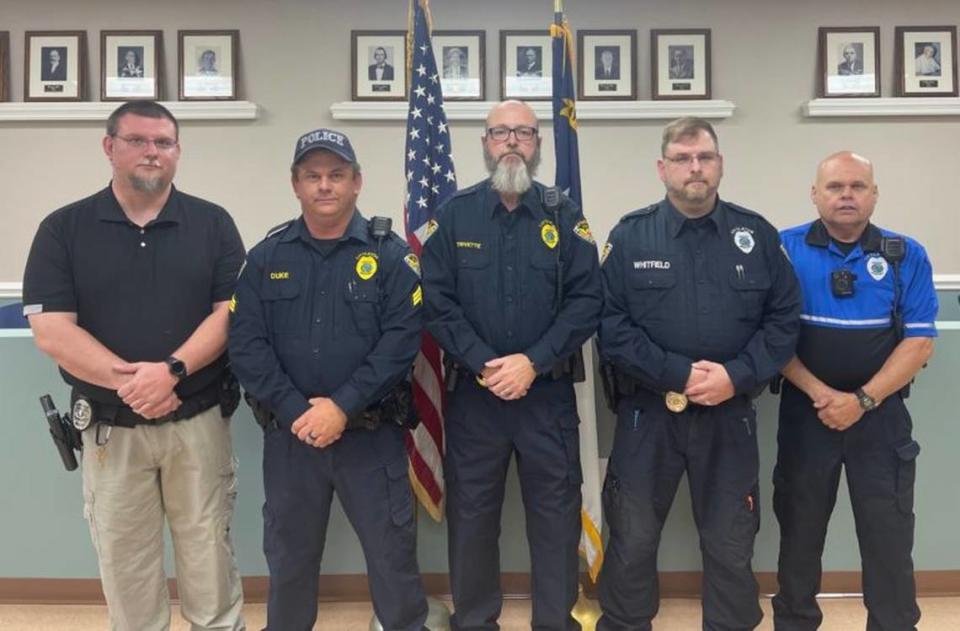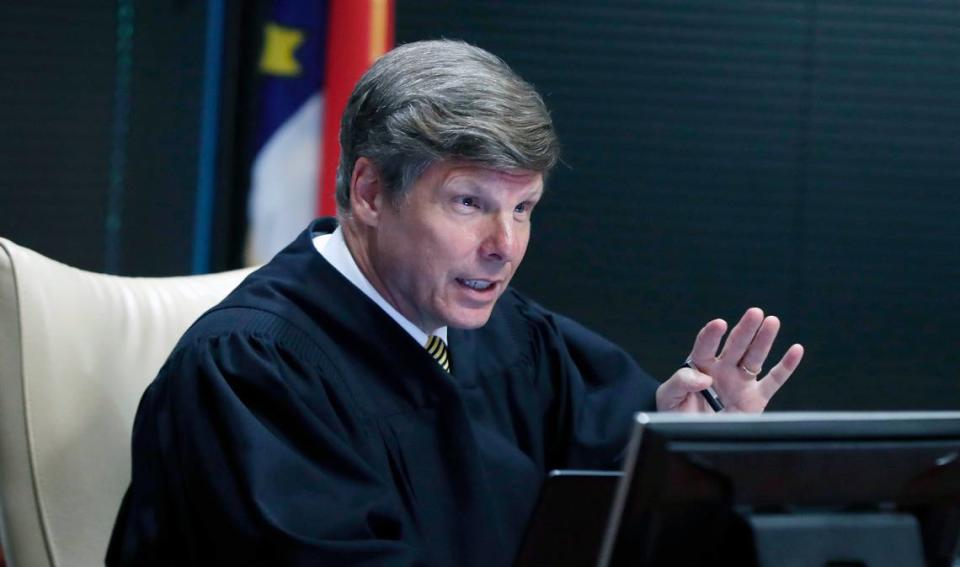Is it easier to get police videos in certain North Carolina cities? What we found.
Dwayne Hicks wants the world to see when an officer, who is now under an SBI investigation, discharged a Taser in his back and arrested him.
Hicks contends that former Warrenton Sgt. Mark Oakley falsely charged him last fall with not having a registration and unscrewed and took his tags. Later Oakley came to his home, pointed a gun at him without cause and shoved a Taser into his back to shock him, Hick alleges in court filings
Oakley, in response, says Hicks was a “conspiracy theorist” who was photographing the officer while driving by him, holding up traffic. Hicks later wouldn’t stay in his vehicle during a traffic stop or put his hands behind his back, Oakley wrote in court documents.
Hicks says footage captured by Oakley’s body camera will show who is telling the truth. Last month he asked a judge to release it to the general public.
But it’s hard to predict whether he’ll succeed. Such requests appear to play out differently across the state.
An Orange County judge approved in 2022 releasing a video of retired Duke basketball coach Mike Krzyzewski’s grandson driving while impaired stop. Judges in Durham have repeatedly approved the release of a variety of police videos to the general public, including after allegations of excessive force against teens and during a traffic stop.
But decisions in cases heard in Wake have appeared a bit more conservative, rejecting requests to release videos of controversial Raleigh police searches at least twice in recent years.
Hicks hopes a judge will come to his aid. The videos will help show his community how police can abuse their powers, he said.
“I think that as long as we do things and keep it hush and keep it closed in the back room, you’ll never actually get to the bottom of it and address the issues,” said Hicks, a 60-year-old Warrenton native and former truck driver turned handyman after an eye injury.
Police recordings, not public record
Since the initial 2016 law on police recordings was established, legislators have made it clear that police body cam and dashboard videos are not public records. The only way they can be released to the general public is through a judge’s order.
Judges must consider eight factors when deciding, including whether a public release could interfere with an ongoing investigation or jeopardize someone’s safety. And if there is a compelling public interest for releasing.
There are other processes for those seeking to simply review videos rather than getting permission to release them to the general public.
Interviews with civil rights and criminal defense attorneys indicate that judges are more likely to say yes to the widest video release if the city or town where the police are employed don’t oppose the release. If they do, It’s an obstacle that people, who like Hicks are alleging police misconduct, may not be able to overcome.
The situation can be particularly frustrating for people who are trying to clear their name after a clash with police. That’s because history has shown that courts and the general public often believe police officers, said Ian Mance, an attorney for the civil rights organization Emancipate NC.
“One of the kind of insidious things about this body cam law is it creates a situation where police officials can miss characterize your actions, and you can’t tell your side of the story,” Mance said.

Differing decisions about body camera videos
But it’s not just what police or municipal officials prefer that determines the outcome of requests, court and city officials say. The situation is more complex, they argue.
↓Sherita Walton, a police attorney for the city, successfully objected to general release of body camera footage in 2022 and 2024, after telling a judge that traditionally Raleigh police only support the release if someone is severely injured or killed by an officer, among other arguments.
In an email, city spokesperson Robin Deacle said whensomeone is killed or seriously injured are examples of situations that create a compelling public interest for the public release.
The statement didn’t address questions about why the city supported body-camera release in 2020 non-critical incidents, including protest footage and an arrest.
“RPD will continue to request the release of BWC footage if there is a compelling public interest, as we do in the case of an officer-involved shooting,” she said.
In Durham, on the other hand, John Roseboro, the city attorney who handles police video cases, doesn’t recall the city objecting to a release of any law enforcement agency recordings.
Successful bids range from incident involving an officer pointing his gun at a teen in 2020 to a traffic stop in which a couple alleged aggressive policing in 2022.
In some of those Durham cases, judges released the videos despite objections from officers, said Daniel Meier, who represented the officers in those cases.
Wake County District Attorney Lorrin Freeman emphasized decisions are dependent on a case’s specific circumstances and ultimately, are up to the judge. However, if someone objects to the release of the video, that gives the judge a different lens to review the circumstances compared to uncontested releases, Freeman said.
Wake Senior Resident Superior Court Judge Paul Ridgeway pointed out that judges consider arguments from all involved and make decisions on the relevant law.

Hicks found guilty then charges dismissed
Earlier this year, the SBI opened a criminal investigation into whether Oakley, the fired Warrenton officer, repeatedly used excessive force on people who weren’t resisting arrest, including Hicks, according to court documents and interviews.
SBI Special Agent C.R. Cloutier obtained three videos and collected statements that supported allegations that Oakley used his Taser improperly, Cloutier states in court documents related to the investigation.
Oakley did not respond to an interview request. Despite Warrenton firing him on March 25, he continues to work for Littleton police.
Attorneys representing Hicks said more than a dozen others have shared complaints with them about interactions with Oakley. Town of Warrenton attorney Mitchell Steyer didn’t respond to questions about the town’s stance on whether Hicks’ video should be released.
Hicks contends that on Sept. 20, Oakley pulled him over in Warrenton’s downtown. Oakley cited Hicks for driving without insurance, impeding the flow of traffic and driving with no tail light. Hicks says he had insurance, a valid registration and working tail lights.
Hicks then drove home, passing Oakley parked about a block from his address, Hicks’ petition states. Hicks got out of the SUV and turned to see Oakley yelling at him, “stay in the vehicle” with his gun drawn, Hicks said.
Hicks walked to the back of his car, preparing to call 911, and Oakley pressed the taser into Hicks’ back, the lawsuit states. Hicks fell to the ground, and the taser left four burned dots on his skin.
Charges from the initial traffic stop, no insurance, rear light violation and impeding traffic, were dropped with the prosecutor writing “compliance.” A district court judge found Hicks guilty of resisting arrest on Jan. 17 and sentenced him to community service.
Hicks appealed the conviction and asked the district attorney’s office for the body camera video for the next trial, which would happen in Superior Court.
The prosecutor later told Hicks he could not have the body-camera footage, but the resisting arrest charge was dropped, Hicks said.
Hicks, who doesn’t have a criminal record, said he is supports law enforcement and thinks they should be paid more and people should obey the law. But when people believe they were mistreated, video from encounters with police should be made public, he said.
“There’s one thing to talk about it, but to show that this is actually what took place, and these are the types of things that do happen out here on the streets with law enforcement,” Hicks said.

NC Reality Check is an N&O series holding those in power accountable and shining a light on public issues that affect the Triangle or North Carolina. Have a suggestion for a future story? Email realitycheck@newsobserver.com
Virginia Bridges covers criminal justice in the Triangle and across North Carolina for The News & Observer. Her work is produced with financial support from the nonprofit The Just Trust. The N&O maintains full editorial control of its journalism.


